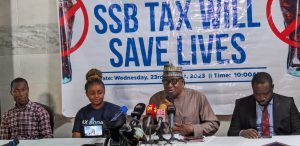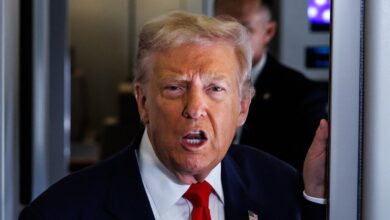
By Edu Abade

Public health experts and advocates have insisted that the Sugar-Sweetened Beverages (SSBs) tax is aimed at curbing excessive consumption of carbonated drinks and reducing diseases associated with sugary drinks such as weight gain, obesity, type 2 diabetes, heart diseases and different types of cancer.
They also stated that the SSBs tax policy is part of the government’s social contract of promoting the public health of Nigerians since the country is the highest consumer of sugar-sweetened beverages in Africa.
This was the verdict of stakeholders, who spoke at a media briefing organised by the National Sugar-Sweetened Tax Coalition in Abuja and attended virtually by journalists in Lagos.
In his welcome address, Executive Director of Corporate Accountability and Public Participation Africa (CAPPA), Akinbode Oluwafemi, urged all well-meaning Nigerians who care about the sanctity of citizens’ health to recognise the critical roles the government and the people must play in ensuring that no one is left behind.
He said beyond drawing attention to the important issue of SSBs tax, media practitioners should be alert to deliberate misinformation from certain sections, adding that some persons were keen on undermining the collective well-being of Nigerians through their daily attacks on government pro-health initiatives aimed at promoting public health by weaning Nigerians off unhealthy diets and lifestyles.
He pointed out that in 2021, the Federal Government imposed a N10/Litre Excise Duty on Sugar-Sweetened Beverages to help reduce the overconsumption of SSBs which have links to over 15 types of cancer, obesity, diabetes and other non-communicable diseases (NCDs).
Speaking further, he stated that SSBs, popularly called soft drinks, have been confirmed by the World Health Organisation (WHO) and other national and international health bodies to have negative impact on health, socio-economic and environmental wellbeing of consumers and communities.
Oluwafemi explained that the tax covers different categories of sugar-sweetened, non-alcoholic beverages and implementation began in June 2022, adding that tax is effective in reducing consumption of SSBs in Nigeria and other countries where they have been effectively introduced and managed.
“It has also helped to improve public health indices, while also reducing some of the environmental problems caused by the indiscriminate disposal of SSB product packages. While we say that the aim is to reduce overconsumption, we must reiterate that these beverages are non-nutritive and have no use in the body. Hence, it can be totally avoided for the good of everyone.
“Interestingly, manufacturers of the unhealthy products through various fronts and ally groups including the Manufacturers Association of Nigeria (MAN), Organised Private Sector (OPS) and other nameless groups have continued to blackmail the government with their heavy media campaign of misinformation and threat to the federal government.
“They have also constantly attacked civil society groups working to ensure that Nigeria institutes effective food policies that will reduce diet-related diseases in the country,” he stated.
Members of the coalition, including Public Health Consultant, University College Hospital, University of Ibadan, Dr. Francis Fagbule, In-Country Coordinator, Food and Nutrition, Global Health Advocacy Incubator (GHAI), Joy Amafah and Economic and Research Expert, Austine Iraoya, insisted that the current N10 per litre remains insignificant and has been absorbed by the industry.
Maintaining that for the desired impact of reduction in consumption and decrease in NCDs, the tax should be increased to a minimum of 20 percent of the final retail price of SSBs, they urged government at all levels not to succumb to the blackmail of the SSBs producers.
They also faulted the myths being created around including that sugar-sweetened beverage tax is regressive and unfair on the poor; tax increase will have negative economic impacts, particularly on employment; taxes on SSBs is unacceptable to the people; taxes do not work in reducing consumption of SSBs and that taxes on SSBs do not work to reduce prevalence of obesity or diabetes.
Insisting that SSBs tax works, they stated five truths about sugar-sweetened beverages, saying it is progressive, poorer households are likely to benefit the most from the tax and that the SSB industry argument is not borne out of evidence, but is based on private interests and quest for profit.
“The second truth is that there is no credible evidence to suggest that taxes on SSBs will have a negative impact on employment losses, it is largely attributable to SSB industries automation and consolidation. The Manufacturers Association of Nigeria (MAN) claims that tax on SSBs will increase unemployment in Nigeria.
“However, the claim fails to account for the fact that any unintended consequences on employment would create jobs for the healthy drinks and beverages industry including the dairy and water industries,” they stated.
According to the coalition, the third truth is that there is strong support for taxes on SSBs among public health stakeholders. Many countries across the world have adopted SSBs taxation as a policy measure to address the health and economic burden of the products.
The fourth truth is that tax on SSBs works in reducing intake of excess sugar from SSBs at the same period. Empirical findings have demonstrated very clearly that SSB tax policy has been effective in reducing consumption of sugary drinks.
Lastly, tax on SSBs reduces the prevalence of obesity and other sugar-induced diseases! Microsimulation globally shows that taxation of sugar-sweetened beverages is an effective policy tool for reducing their consumption and consequently reducing the prevalence of sugar induced diseases.
“Evidence from a modeling study shows that the United Kingdom’s tax on soft drinks could potentially save up to 144,000 persons from obesity annually, prevent 19,000 cases of type 2 diabetes and avoid 270,000 incidences of decayed teeth,” it added.











